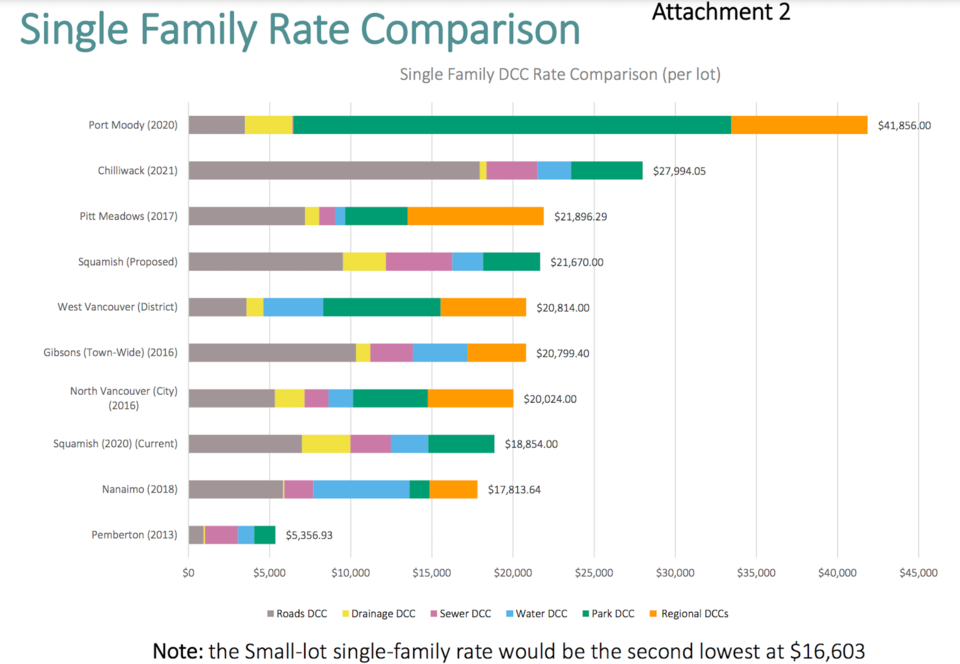The District of Squamish is poised to raise almost all of its development cost charges, or DCCs, meaning developers will likely soon have to pay the municipality more money to cover the cost of infrastructure.
, council voted unanimously in to update the development cost charge bylaw. As a result, the bylaw has been sent to the provincial inspector of municipalities. If the inspector approves of the changes, it will be forwarded back to council, which will then be expected to adopt the measure.
Development cost charges are the fees levied on developers whenever they create a new project. These fees are intended to cover the costs that the municipality would spend on paying for infrastructure associated with the development's creation.
Some examples would include roads, sewers and sidewalks.
"They foster fairness, so growth pays for growth," said Jenn Waite of Urban Systems, a consultant who was hired by the municipality. "This ensures that there is no undue burden on existing residents [and the] municipality when growth is occurring, and that the benefits of growth-related upgrades are evenly distributed."
Staff recommended changing the rates to allow for a 15% increase at the most and a 1% decrease at the lowest.
"The DCC increases are lower or comparable in changes to housing and land costs since the previous updates," said Waite. "Stakeholder engagement supported the modest increase in DCC rates."
Here are the proposed rates:
Single-family housing in a low-density area would be $21,616 per lot, up from $18,854, a bump of 15% from the previous 2021 rate.
Single-family housing in a small lot would be $16,603 per lot, up from $15,922, an increase of 4%.
Townhouses would cost $10,747 per unit, up from $10,618, a minor jump of 1%.
Apartments would increase to $7,677 per unit, up from $7,120, an uptick of 8%.
Based on each square metre of gross floor area, commercial DCCs would jump to $117.64, up from $111.57, a 5% increase.
Institutional DCCs would increase to $99.89 per square metre, up from $90.10, representing a jump of 11%.
Finally, industrial properties will actually face a decrease in their DCC rates, the only type of property to experience a downward movement in their fees.
They will be paying $78.88, down from $79.86 per square metre, representing a decrease of 1%.
"When factoring in other comparable community municipalities, Squamish['s] proposed development fees are generally in the middle or low end of comparable residential rates, and at the higher end for non-residential rates," said Waite. "Transportation represents the greatest proportion of the total DCC programme value."
All on council were supportive of the proposed changes to the DCC rates.
"I feel that we've had a thorough discussion about these rates leading up to get us to the point [where I'm] pleased with all the work that has been done by staff, by the consultants, stakeholders," said Coun. John French.
"Just wanting to point out that it's important for residents to know that the development cost charges are reviewed regularly, and with growing interest in development opportunities in our community, we can be confident, I think, that these values will be revisited again soon to make sure that Squamish keeps the charges at appropriate levels to make sure that Squamish gets appropriate value from future development."
Coun. Eric Andersen said that there had been a steady improvement in getting stakeholders engaged in the process.
"I have been an observer of probably four or five DCC bylaw reviews over the past decade, 12 years or so, and I see a steady improvement — and not least in engagement — and I wanted to comment specifically about that," Andersen said.
Mayor Karen Elliott said completing DCC changes before the upcoming election in October will allow the next council to focus on more pressing matters.
"I'm really pleased that we are completing this major overhaul to the DCC rates before the next election," said Elliott. "I think one of the key things in a community that's growing quickly is that you always want to make sure you have an up-to-date policy that's keeping up with your growth and reflecting that growth. So this is, I think, a gift to the next council — whoever is elected in October — so that they can focus on getting up to speed and, and determine their strategic plan."


.png;w=120;h=114;mode=crop)

